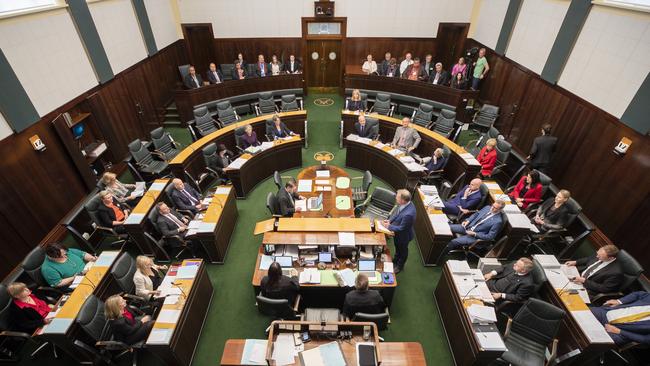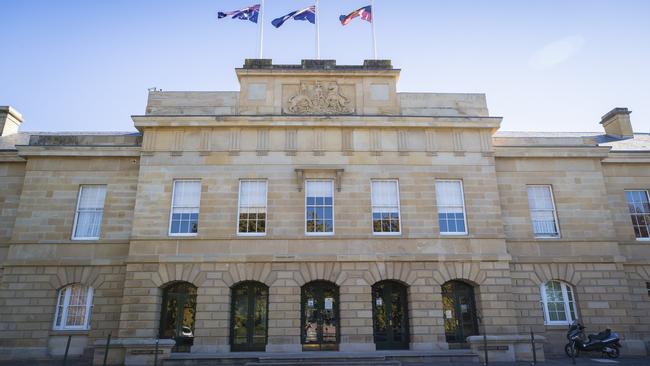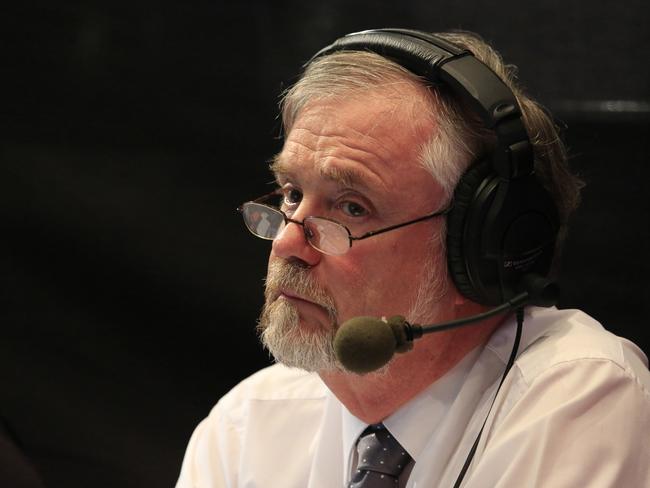Tasmania election 24: Poll shows end of majority rule in Tasmania with as many as 10 seats going to minor parties and independents
Minor parties and independents are set to make big gains in Tasmania, a detailed seat-by-seat poll shows. See the results

Tasmania
Don't miss out on the headlines from Tasmania. Followed categories will be added to My News.
The era of majority government in Tasmania appears to be over – with new polling showing the support of independent and minor party candidates will be critical in deciding who forms the next state government.
A detailed seat-by-seat poll reveals that the March 23 state election shows voters deserting the major parties for minor parties – largely the Jacqui Lambie Network – and independent candidates.
If the polling was reflected in the election result, the next parliament could consist of 14 Liberal members, 11 Labor, four Greens, two Jacqui Lambie Network and four independent MPs.
The leaders of both major parties have ruled out a deal with the Greens, but both could be in the running to form government if they can win the support of enough crossbenchers to reach 18 votes in the new 35-seat House of Assembly.
Deal making could be made more complicated by the number of disgruntled former party members.

The Mercury has obtained the results of a statewide telephone poll of 4000 voters was conducted in the first week of the campaign.
The polling reveals in the seat of Clark, the Liberals enjoyed 26 per cent support among respondents, independents 25 per cent, the ALP 24 per cent, and the Greens 16 per cent.
That points to the likely election of two independents in that electorate alone – with sitting member Kristie Johnston and former Liberal MP Sue Hickey the likely frontrunners.
In Franklin, the Liberals enjoyed the support of 33 per cent of voters, Labor 24 per cent, the Greens 20 per cent and the Lambie Network and the independents eight per cent each.
Former Labor member David O’Byrne is mounting a strong campaign as an independent in that seat.
PEOPLE’S FORUM: LEADERS TO GO HEAD TO HEAD
In Lyons, the Labor vote was put at 35 per cent, the Liberals at 34 per cent, the Greens at 12, JLN at eight per cent and independent candidates at 10 per cent – pointing to a strong possibility former Liberal MP John Tucker could be returned.
Support for the Jacqui Lambie Network was placed at eight per cent statewide in Wednesday’s EMRS poll, although the concentration of support in the state’s north suggests the party could see two members elected.
A quota for election will be 12.5 per cent of the formal vote.
the polling result in Bass saw support for the Liberals at 37 per cent, Labor at 28 per cent, JLN at 15 per cent and the Greens at 13 per cent.
And in Braddon, the Liberals had 45 per cent support, Labor 26, the Greens 5 per cent and the Lambie Network 15 per cent.

Professor Richard Herr said that reality was changing in Tasmanian politics – particularly for major parties.
“We’re going through a period where fewer people identify with parties,” he said.
“We have seen over the last generation the growth of non-aligned voters.
“The parties have to adapt to it and they have to be good at negotiating outcomes, [and] I’d place equal obligation on the minor parties and the independents,” he said.
“It isn’t just for the major parties to make government work, it is the crossbenchers who have to be willing to behave responsibly and to recognise we need a workable government.
“They can have greater influence by being part of the solution than by being a continuing part of the problem”.
The cost of living was revealed as the top issue in every electorate, with health the second, and housing third.
Climate change is rated next in Clark, Franklin and Lyons, with jobs and the economy in fourth place in Bass and Braddon.
The poll also explored support for an AFL team and a stadium.
Support was highest for the local team in Clark, with 53 per cent in favour and lowest in Bass, where 35 per cent of those said they supported a team being established in the state.
Support for the government’s stadium proposal was low.
In Clark, 36 per cent of people support the stadium and 55 per cent are opposed, with the remainder being undecided; in Franklin, 39 per cent supported the stadium and 55 per cent were opposed.
Support for the stadium was lowest in Braddon with 27 per cent in favour and 62 per cent against and in Bass with 21 per cent in favour and 67 per cent against.
The poll found significantly more support for the Stadium 2.0 proposal – with 40 per cent of those who supported a stadium preferring it to the 12 per cent supporting the Macquarie Point proposal, with the remainder being unsure.
The result was similar in Clark, with 14 per cent support for the government-backed stadium and 33 per cent support for the unsolicited bid.





